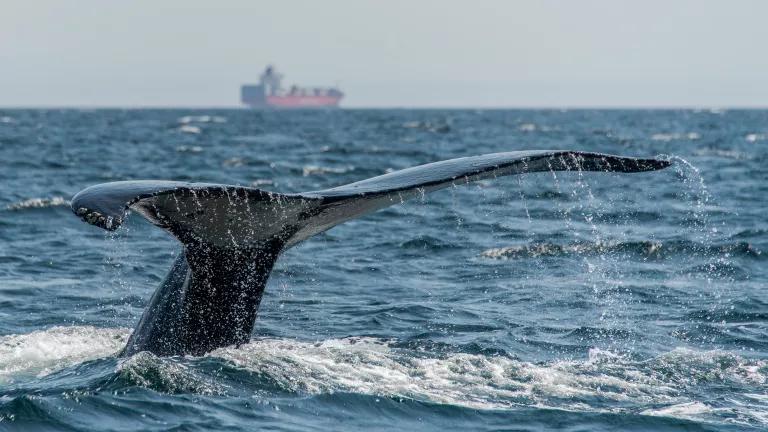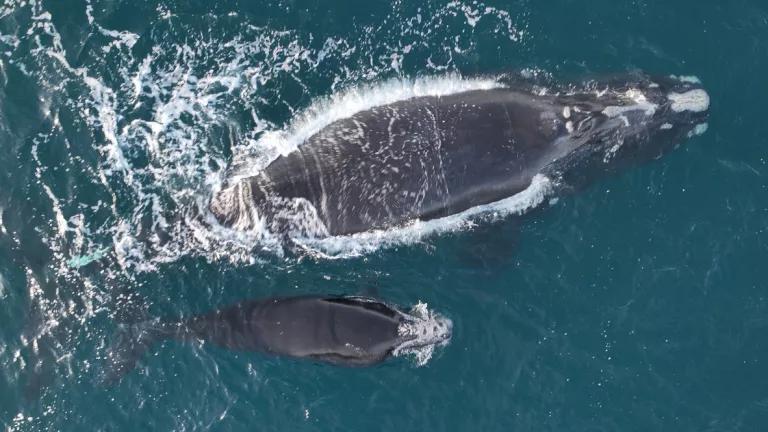Big Win: Congress Takes Action to Protect Whales
Congress has enacted the most consequential legislative package for marine mammals in years.

A humpback whale shares waters with a large commercial vessel in the Salish Sea.
Dreamstime
Included in this year’s annual defense spending bill are a suite of new conservation measures aimed at reducing the impacts of ships and other vessels on marine mammals. They come at a time when ship collisions and chronic vessel noise are contributing to the decline of some of our most endangered, iconic whale populations, including the North Atlantic right whale and the Southern Resident orca. Together with provisions improving the nation’s stranding response and investigation programs, Congress has enacted the most consequential legislative package for marine mammals in years.
The package was championed in the House by Representatives Rick Larsen and Raul Grijalva, and in the Senate by Senator Maria Cantwell, who were able to generate bi-partisan support for the vessel provisions in both chambers. The deal to include the marine mammal package in the defense bill was clinched by House Armed Services Committee Chairman Adam Smith, with the support of House and Senate leadership.
Here's what this landmark legislative package does for marine mammals:
Leverages technology to reduce harmful interactions between vessels and marine mammals.
NOAA will develop a near real-time monitoring and mitigation program focused on the critically endangered North Atlantic right whale, which are experiencing unsustainable declines due in part to vessel strikes. From the solitary satellites in our skies to the unmanned vessels in our seas, smart design and deployment of existing and emerging technologies can allow us to detect and monitor the locations of large whales and protect them from vessel impacts and other threats in real-time.
One example of how this is already working is California’s Whale Safe program, led by the Benioff Ocean Science Laboratory, which uses AI-powered ocean sensors, big data models, and citizen science data to help reduce lethal collisions between endangered whales and large ships in Southern California. Real-time detection of whales can, if effectively deployed and tied to operational mitigation protocols, foster responsible ocean use alongside recovering whale populations.
The pilot program will give NOAA the chance to determine the optimal mix of technologies while also testing mitigation protocols for various industry sectors that could come into conflict with whales. Once the program lands on a successful blueprint, the pilot will be expanded to protect other imperiled whales in different geographies.
Establishes a “Whale Desk,” manned by the Coast Guard in Puget Sound, to warn mariners when whales are present.
Busy shipping lanes and numerous vessels carve through the Salish Sea, which makes up the core of critical habitat for the endangered Southern Resident orcas. Responsible mariners can and do consult whale alert apps to assist in plotting navigational courses and speeds that can help protect the orcas and other large whales, but this information can be difficult to track in real-time when the ship must also stay alert to safety and navigational concerns.
The pilot Whale Desk will collate disparate data streams on whale locations, and communicate with mariners directly, assuring that all mariners are made aware of and can take appropriate action when whales are nearby. Over time, the Whale Desk can also integrate the detections from NOAA’s near real-time monitoring program. And it will aid in enforcement of vessel buffer zones put in place to protect orcas, and assist in making mariners aware of other regulatory and voluntary guidance to ensure vessels and whales safely share waters. The Puget Sound Whale Desk will also coordinate with Canada’s Whale Desk, which carries out similar duties in the Canadian waters of the Salish Sea, ensuring full coverage throughout the orca’s critical habitat.
Supports busy U.S. seaports to manage ship traffic in ways that limit vessel disturbance and risk to marine mammals.
Many of the nation’s busiest seaports share waters with endangered whales. As vessels transit in and out of those ports, they not only emit underwater noise, they can also physically displace whales from their feeding grounds and, in the worst of circumstances, can strike a whale, leading to serious injury or death, and in some cases, damage to the vessel itself. A small number of port-led initiatives have been developed, primarily along the West Coast, to mitigate these threats through innovative new programs. For example, the Canadian ECHO Program and Washington State’s Quiet Sound are developing locally-appropriate solutions to reduce vessel noise and disturbance to Southern Resident orcas.
The new grant program will provide federal support for U.S. seaports to fund new and existing initiatives that meet the goal of encouraging the co-existence of whales and commerce. This new funding can dramatically improve the safety of port waters for imperiled whales and other marine mammals.
Increases government investment and focus on vessel quieting technologies.
Underwater noise from vessels, the most pervasive source of man-made noise in the ocean, continues to double each decade. In the case of Southern Resident orcas, for example, vessel noise is directly contributing to the lack of recovery of this endangered population, by interfering with the whale’s ability to communicate with each other and to echolocate to find its scarce prey. We can and must build quieter vessels, and this bill directs the Maritime Administration to ramp up its efforts to work with the shipping industry to identify and progress technologies and best practices to make ships quieter and more efficient.
Furthermore, as I’ve written here, the coming decade will be an inflection point in shipping technology as the world moves to decarbonize this sector, creating a unique window of opportunity to make sure tomorrow’s vessels are both carbon free and quiet. The bill will stand up a new Center for Maritime Innovation that can coordinate and align such research, identify gaps, and help disseminate results to the maritime sector.
Expands efforts to track the scope and severity of underwater noise pollution to inform responsible management.
Underwater noise affects myriad forms of marine life. In addition to interfering with communication, foraging, and navigation in marine mammals, underwater noise has been shown to slow the recovery of seagrass, and reduce reproductive success in fishes and invertebrates. Natural resource managers need a better understanding of the scope and severity of noise in key habitats to effectively mitigate its impacts.
Now, NOAA will have new backing to expand its monitoring of underwater noise, including by leveraging public/private partnerships. That will promote understanding of how underwater soundscapes are changing, and help scientists understand changes in marine mammal distributions or migration pathways, with important implications for reducing vessel impacts on these populations.
In total, the provisions included in this year’s defense spending package will help make it easier for vessels and whales to co-exist. It will scale innovative technological solutions, advance proven models of success, and help deliver vessels that are both quiet and carbon free.
This is a rare and wonderful series of legislative wins for marine mammals. NRDC is grateful to all the policy-makers, most especially Senator Cantwell and Representatives Larsen and Grijalva, who fought to advance these important programs.




